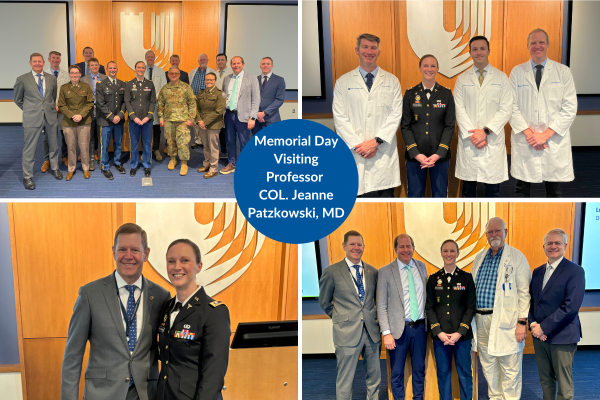
Memorial Day Visiting Professor COL Jeanne Patzkowski, MD, LTC, MC, USA, Chair, Department of Orthopaedic Surgery, Brooke Army Medical Center, shared her pioneering journey as a military surgeon, navigating and conquering the most challenging terrains of her field.
She is a trailblazer for military orthopedics, overseeing 250 orthopedic surgeons and seven training programs, advising the U.S. Surgeon General, and being the first chairwoman at Brooke Army Medical Center (BAMC). BAMC is the only Level 1 Trauma Center within the Department of Defense. It provides care for injured patients and serves both civilian and military populations.
‘My path to into the military began in 2000 at the U.S. Naval Academy to play soccer, and following precocious opportunities led me to a medical career within the U.S. Army,” she shared.
Patzkowski pointed out that the care extended within military conflicts led to vast improvements in orthopedic care worldwide. “Our ‘why’ is our patients.” Soldiers present a unique challenge because they want to return to physical activity in the field and their lives almost immediately. They are not satisfied sitting still. Running correlates to ‘normal’ for injured soldiers and helps them return to their deployed capacity.”
Despite the punishing weather and physical elements encountered while deployed (e.g., 100-degree temperatures), this group shares much love, support, and commonalities. She continued, “I am a sports medicine-trained surgeon. However, we are not subspecialists on a base. We all become trauma surgeons and medics.” Typically, a base has a general surgeon, an orthopedic surgeon, an anesthesiologist, and nurses banded together to do damage control. “By using creative thinking and agility, we make it happen and get to ‘yes.’ It’s not about getting the credit; it’s keeping the ship running.”
The military puts capable people into leadership positions quickly. “I’ve led during a time containing a fractured culture with combative politics, COVID, and world issues. I had to balance management and leadership – both are important. We all share a responsibility to shepherd the next generation of leaders. Don’t be blind to the faults of your subordinates. Sit down and talk with them to build the team's trust.”
She continued, “A military career is temporary; however, the mission is lifelong. You cannot undo your first impression. I guarantee that you will never regret being kind. Offer grace in the clinical space.”
“By using creative thinking and agility, we make it happen and get to ‘yes.’ It’s not about getting the credit; it’s keeping the ship running.”